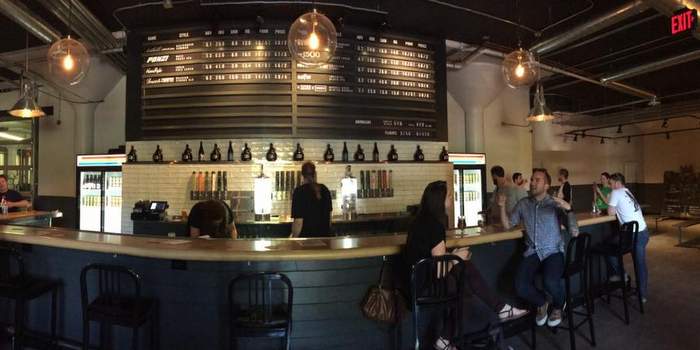
The taproom can be a key part of many breweries these days, helping to build community, grow product awareness and of course, add to the brewery’s bottom line. That said, operating a taproom without considering the risks related to serving alcohol on site – or even simply serving food – could be disastrous for a business. Here, we’ll look at what operating a successful taproom entails and how a brewery can mitigate risk related to serving food and alcohol onsite.
Alcohol: Playing by the rules
Breweries already have to abide by a number of laws designed to ensure the safety of their customers. These regulations, called dram shop laws, vary on a state-by-state basis, but generally determine to what extent a taproom or bar is responsible for any damage or injury caused by an intoxicated individual.
One of the most common dram shop laws is fairly common sense: don’t serve alcohol to minors. This is illegal and a costly liability. Overserving is another fairly common issue. In many states, if a customer is clearly heavily intoxicated, the responsibility falls on the establishment to stop selling drinks. The person responsible for overserving could be held liable for damages caused by the customer. Some dram shop laws are also outlined on the liquor license, such as the legal hours for businesses to sell alcohol. Violating these can result in the loss of an establishment’s liquor license in addition to heavy penalties.
For example, let’s say there’s a customer at a brewery in Pennsylvania, ordering drinks and having a good time. At first, nothing seems unusual about the customer but, eventually, his speech becomes slurred and he has trouble walking and staying upright. If the bartender continues to serve alcohol to this individual, and then the customer were to drive home and crash into another vehicle on his way, the injured party could take the brewery to court for overserving an intoxicated customer and causing them damages.
Despite these risks, adding a taproom to a brewery can be both financially rewarding and less worrisome with proper risk management. Beyond following the basic laws and regulations surrounding dram shops, it’s also important for breweries to take steps to mitigate their risk, including the following:
- Provide in-depth training: Staff should be prepared to handle any and all types of issues that may arise in a taproom, such as risks related to overserving, disruptive customers and more. Consider a training program such as TiPS to ensure employees know best practices for interacting with patrons and are aware of when they need to intervene. An untrained or unaware staff member can end up costing the brewery.
- Strictly abide by open hours: Make sure taprooms are closed by the listed hours to avoid any risk of serving customers illegally.
- Implement protocol to prevent drunk driving: We all know drunk driving is a significant risk to both the business and to local communities. Breweries with taprooms should keep a careful eye on their patrons and ensure they have a safe way home.
- Provide safe activities to entertain customers: Hosting game nights, such as trivia, can help keep customers responsible and attentive and limit the chances of them drinking too much at the taproom.
- Consider using video surveillance: Video surveillance provides bartenders and other employees with a way to demonstrate in court if necessary that they followed protocol. If a customer involved in an accident claims they were overserved by the bar, the video can validate the bar’s defense that they stopped serving the individual.
- Implement a pet policy: It’s not unusual to see dogs at the feet of their owners while they enjoy a beer on a taproom patio, but brewery owners need to realize that they are taking on additional risk exposure by allowing dogs on the premises. Brewery owners should first check with their local city council to see if pets are permitted and what may be required of a business hosting pets. Further, they should clearly post and enforce a pet policy and consider any possible health code violations. Further, while most dogs may be friendly, just one dog bite to a customer or even another dog in the building could leave the brewery liable to pay for costs related to injuries and other damages.
Food service: What to keep in mind
Often, along with a good drink comes a bite to eat. Breweries want to be able to meet demand for dinner and late-night snacks so customers don’t have to head to another restaurant for food. (Plus, serving food is a good practice for combating over-serving alcohol.) But before deciding to offer food service in the taproom, once again brewery owners should consider new risk exposures related to food service.
Food allergies are a dangerous exposure. If a customer states their allergy and they are mistakenly served cross-contaminated food or food with the allergen, the brewery could be held liable for the damages.
When serving food, allergies are not the only concern to consider. Best practices for maintaining a safe taproom kitchen should include:
- Regular hood/duct cleaning: Over time, a kitchen can build up grease from its appliances and a clogged hood or duct could prove dangerous to staff and customers. Regular cleanings can prevent dangerous excess fumes and heat. Cleaning and maintenance should be conducted by a reputable, professional and insured kitchen maintenance company.
- Regular Ansul system maintenance: Ansul systems ensure the property is fire-safe using detectors, fire extinguishers and more. Business owners should routinely check their systems to confirm everything is functioning. Again, cleaning and maintenance should be conducted regularly by a reputable, professional and insured kitchen maintenance company.
- Food preparation standards: Make sure staff members working in the kitchen are properly following food preparation standards. At minimum, they should be wearing gloves and regularly cleaning surfaces with approved cleaners. Food poisoning and other issues can prove extremely damaging to a taproom’s reputation and cause considerable financial damage.
As many of us have experienced firsthand, a taproom can be a wonderful place to enjoy a good beer and good company. For brewery owners, a taproom can also be a lucrative investment if implemented correctly. Breweries with taprooms or those considering adding a taproom should be sure to take the time to step back and assess their current risk management protocol and make any necessary changes to ensure the taproom runs smoothly for the safety of the customers, employees and the business itself.
One good way to ensure a brewery has taken the right steps to mitigate risk related to a taproom, is for the owner to consult with an insurance professional who specializes in breweries. They know the industry, its risks and how to best protect against them.
Paul Martinez is Brewery PAK Program Manager for PAK Insurance Programs.





Leave a Reply
You must be logged in to post a comment.